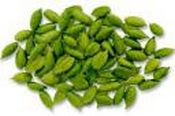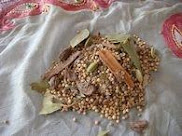Slow cooked Duck Curry
Vegetable Pilau
Peach Chutney
Recipe from The New Curry Secret
We are in the big dry. A whopping 80% of the State of NSW is now officially drought declared with the Central Tablelands, within which Orange lies, the latest victim of these harrowing statistics. We had only 25mm of rain last month (November) and it has been hot. The same month the previous year delivered around 135mm of rain without these hot temperatures. Evaporation at this time of year generally exceeds rainfall anyway - 135mm of rain, 145mm evaporation - so it always appears dry but this summer is exceptional. There has been no rain so far this month. The golden hills of straw have begun to turn brown with hot winds thirstily sucking every last drop of moisture out of all in its path including my veggie beds. I have had difficulty getting my summer vegetables going. I put in lots of seeds - carrots, lettuce, beetroot, rainbow chard, radishes and other spring goodies directly into the raised beds but very little germinated. The soil had become dry. I re-sowed and have tried to keep the water up with some success but the soil dries out so quickly it is quite a challenge, particularly as we are still away in Sydney every couple of weeks. I'm continuing to water the fruit trees with washing up water, scooping the last cupful out of the sink, and now I take a bucket into the shower too. Every bucket full is a tree watered. My heart goes out to the farmers. The odd bucket full of water won't help them much. To compound my sadness, we saw the cattle off to the sale yards this afternoon. They had eaten the last blades of dry grass and were being hand fed - an expensive exercise. The paddock below looks a little empty without them.
Delivering a bale of hay for hungry cows
(the concrete water tank that will service the main house in the back ground)
Despite all this, I feel this is truly God's country. It's beauty and serenity scarcely diminished by the hot, dry, dusty summer conditions. When we sit out on the verandah of our little cottage in the evening, look over the hills that roll along for miles and feel the cool mountain air on our faces, the heat of the day becomes a distant memory.
It's hard to imagine that we are sitting bang in the middle of the crater of a huge volcano that stopped breathing probably some millions of years ago, but we actually are. The rich volcanic soils and the (usually) cool mountain climate is ideal for growing food and I love it here. The main house is nearing completion, the plasterers and tilers are in there right now and a late March to early April move-in is now imminent. Look out for lots of cooking and blogging when I have a real kitchen!
It's hard to imagine that we are sitting bang in the middle of the crater of a huge volcano that stopped breathing probably some millions of years ago, but we actually are. The rich volcanic soils and the (usually) cool mountain climate is ideal for growing food and I love it here. The main house is nearing completion, the plasterers and tilers are in there right now and a late March to early April move-in is now imminent. Look out for lots of cooking and blogging when I have a real kitchen!
In the meantime I manage reasonably well (albeit with a little frustration) with a couple of hotplates in the little cottage kitchen, making chutneys, sauces and preserves to take advantage of the lovely local produce. Totally Local, my favourite place for anything I don't grow yet, have begun stocking duck. I bought one a little while ago, cut it into portions, roasted the breasts and froze the remainder. Served with fresh vegetables from the garden, roasted pear and a sauce made with my quince paste, the duck breast was delicious. A couple of days ago, I felt I needed a curry fix and with all that duck taking room in the freezer it was the obvious choice. I don't normally use duck for curries, but was encouraged to do so by John Byrne asking me a little while ago if I had a duck curry recipe. I hadn't so John sent me one. John is a self proclaimed fan of my books and through his questions and suggestions via e-mail we have become friends. He is also now a fellow blogger with some wonderful recipes on his blog Easy Cooking Easy Recipes.
I have not followed John's recipe yet but I have definitely drawn inspiration from it.
Slow Cooked Duck Curry
This is an easy recipe that produces a rich spicy curry that is even better when eaten the next day. So if time permits cook it the day before you intend to eat it to let the flavours develop. The fruity sweetness of the peach chutney is ideal with this curry but mango or any other sweet chutney would be also be good.
Duck has a lot of fat under the skin and as you can see from the picture, there is quite a bit of oil on top of the sauce. I spooned at least two tablespoons of it off the top before serving the curry and unless you like your curries quite greasy, it's a good idea to do that. Or you can remove the skin and discard it after you have browned the duck pieces to reduce the oilyness.
Serves 4
Spice blend: Grind or pound to a fine powder 1 tsp fennel seeds, 2cm piece cinnamon, 2 cloves, 4 green cardomoms, 1 tsp coriander seeds, 1 tsp cumin, ½ tsp black peppercorns.
1 duck approx 1.8-2.0 kg in weight
3 large cooking onions, roughly chopped
4 large cloves garlic, peeled and chopped
Thumb sized piece of ginger, peeled and chopped
2 or more green chillies, chopped
1-2 tbsp olive oil
1 tsp turmeric
1 tsp sugar
2 fresh ripe tomatoes, chopped
1 ½ -2 tsp salt to taste
½ tsp garam masala
1 tbsp chopped coriander
- Cut the duck into pieces - 2 thighs, 2 drumsticks and 4 breast pieces. You might like to keep the wings too, but discard the wing tips. Remove the excess fat and skin that hangs from the sides and ends of the bird, leaving only the skin on top of the meat. Rinse well and pat dry with kitchen paper.
- Place the onion, garlic, ginger and green chillies in the bowl of a food processor and process until finely chopped. Set aside.
 Heat a large heavy based sauce pan or crock pot on medium heat and spray with a little oil. Add about half the duck pieces, skin side down and brown well. Make sure the pan is hot enough and don't overcrowd or the duck will stew rather than brown.
Heat a large heavy based sauce pan or crock pot on medium heat and spray with a little oil. Add about half the duck pieces, skin side down and brown well. Make sure the pan is hot enough and don't overcrowd or the duck will stew rather than brown.- Turn each piece over and brown on the other side.
- Transfer browned duck pieces to a clean bowl or plate and repeat with remaining duck pieces until all the duck is nicely browned.
- There will be quite a bit of duck fat in your pan by now. Stir the prepared spices into the hot duck fat and cook for a minute or until aromatic.
- Add onion mixture and a tablespoon of oil and cook on low-medium heat stirring, for about 7 minutes. You don't need to brown the onion but add some more oil if pan seems too dry.
- Stir in the turmeric followed by the sugar tomatoes and salt. Turn down the heat and cook covered for about 5 minutes, stirring once or twice until the tomatoes are pulpy.
- Return the duck pieces and any juices to the pan and stir around the pan until all the pieces are coated in the sauce.
- Add 3 cups of water and bring to boil. Turn the heat to low, cover pan and simmer for 1½ - 2 hours unitl the duck is very tender and the meat is almost falling off the bone. Stir the sauce and turn over duck pieces every 15 minutes or so during that time.
- Stir in the garam masala and simmer for a minute. Turn off the heat and sprinkle with fresh coriander. Serve with chutney, rice and chappatis or nan. Yum!
Vegetable Pilau
Unless you're serving a vegetable side dish with the duck curry, this pilau is perfect with this spicy curry. I've only used diced carrot in this recipe because that's about all I had but a combination of carrots, peas and beans would be nice.
This method of cooking rice will produce lovely fluffy results everytime.
1 cup Basmati rice
1 tbsp ghee or olive oil1 large or two small carrots, peeled and diced
2 tbsp finely chopped onion
4 green cardamoms
3 cloves
1¾ cups cold water
½ tsp salt
- Wash the rice in several changes of water and leave to drain in a large sieve. Pre-heat oven to 170°C, 325°F or gas mark 3.
- Heat the ghee or oil in a heavy based pan with a tight fitting lid and stir fry the carrot, onion and spices for 2 minutes on medium heat.
- Stir in the drained rice and mix well to coat all the grains with the ghee or oil. Cook on medium heat for about a minute.
- Add the water and salt and bring to the boil. Once boiling, turn the heat to very low and place the lid firmly on the pan.
- Stir the rice after about 5 minutes, and again after about 3 minutes. Re-cover and leave for a further 4-5 minutes after which time all the water will have been absorbed.
- Place pan in oven for about 20 minutes to dry off the rice.
- Transfer pilau to serving dish taking care not to break the grains of rice. Fluff up with fork. Serve immediately or cool and refrigerate for later use.
- Re-heat in a microwave oven for about 2 minutes.
This fruity chutney goes well with cold meats, cheese and sausages as well as spicy curries. You can buy bruised and misshapen fruit but it’s important that it is sweet and ripe as tasteless fruit will produce tasteless chutney. Nectarines work well in this recipe too.
Makes about 500 ml (18 fl oz)
1 kg ripe peaches
2 large onions, sliced
200g golden raisins
250ml cold water
370ml malt vinegar
250g white sugar
2 tsp grated ginger
1 tsp chilli powder
- Wash fruit well, remove stones and chop flesh coarsely. Place in a large heavy based saucepan with the raisins and water, bring to the boil and simmer uncovered for 20 minutes, stirring once or twice.
- Add all remaining ingredients and bring slowly back to the boil, stirring to dissolve the sugar.
- Simmer partly covered for about 1 hour 15 minutes, stirring occasionally.
- Spoon the hot chutney carefully into warm sterilised jars, place lids on firmly and invert each jar for two minutes.
- Store chutney in a cool dry place. Store in the fridge after opening















0 comments:
Post a Comment